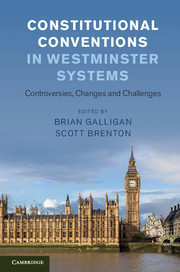10 results
Conclusion
-
- Book:
- Constitutional Conventions in Westminster Systems
- Published online:
- 05 August 2015
- Print publication:
- 04 August 2015, pp 261-265
-
- Chapter
- Export citation

Constitutional Conventions in Westminster Systems
- Controversies, Changes and Challenges
-
- Published online:
- 05 August 2015
- Print publication:
- 04 August 2015
Introduction
-
- Book:
- Constitutional Conventions in Westminster Systems
- Published online:
- 05 August 2015
- Print publication:
- 04 August 2015, pp 1-7
-
- Chapter
- Export citation
Index
-
- Book:
- Constitutional Conventions in Westminster Systems
- Published online:
- 05 August 2015
- Print publication:
- 04 August 2015, pp 266-276
-
- Chapter
- Export citation
6 - Minority and multi-party government
-
-
- Book:
- Constitutional Conventions in Westminster Systems
- Published online:
- 05 August 2015
- Print publication:
- 04 August 2015, pp 116-136
-
- Chapter
- Export citation
1 - Constitutional conventions
-
-
- Book:
- Constitutional Conventions in Westminster Systems
- Published online:
- 05 August 2015
- Print publication:
- 04 August 2015, pp 8-23
-
- Chapter
- Export citation
Notes on contributors
-
- Book:
- Constitutional Conventions in Westminster Systems
- Published online:
- 05 August 2015
- Print publication:
- 04 August 2015, pp vii-xi
-
- Chapter
- Export citation
Contents
-
- Book:
- Constitutional Conventions in Westminster Systems
- Published online:
- 05 August 2015
- Print publication:
- 04 August 2015, pp v-vi
-
- Chapter
- Export citation
Acknowledgements
-
- Book:
- Constitutional Conventions in Westminster Systems
- Published online:
- 05 August 2015
- Print publication:
- 04 August 2015, pp xii-xii
-
- Chapter
- Export citation
Copyright page
-
- Book:
- Constitutional Conventions in Westminster Systems
- Published online:
- 05 August 2015
- Print publication:
- 04 August 2015, pp iv-iv
-
- Chapter
- Export citation

